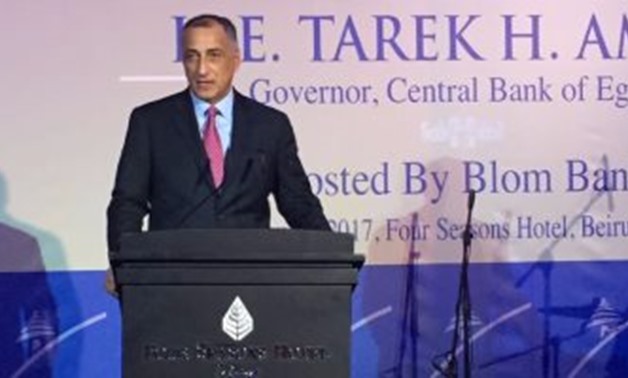
FILE – Governor of the Central Bank of Egypt (CBE) Tarek Amer
CAIRO – 15 September 2019: The success of the economic reform program raised real growth rates to 5.5 percent at the end of March, and the balance of payments achieved a surplus of $12.8 billion by the end of fiscal year 2017/2018, Governor of the Central Bank of Egypt (CBE) TarekAmer said.
Speaking at the opening session of the Board of the Arab Central Bank Governors on Sept. 15, Amer added that foreign currency reserves hit highrecords of around $45 billion, and overseas bank balances rose to about $18 billion by the end of August.
He pointed to Egypt's success in achieving financial and monetary stability came from supporting the decision to liberalize the local currency exchange rate, which supported the ability of the Ministry of Finance to control the budget, in addition to increasing employment opportunities to reduce unemployment rates to 9.9 percent.
Amer noted that the coordination between the government and the Central Bank was the main reason for the success of the economic reform program implemented by Egypt during the past years.
Amer referred that the program has contributed to restoring the confidence ofthe international financial institutions, pointing out that the support provided by the political leadership contributed to the success of this program.
Moreover, he stressed that the Egyptian banking sector played a strong role in the success of the economic reform program, which prompted the International Monetary Fund to praise the program, which has been implemented for over three years.
In November 2016, the Executive Board of the IMF approved a $12 billion loan as a financial assistance to Egypt to support the Egyptian economic reform program.
Upon the board's approval in November, Egypt embarked on a bold economic reform program that included floating its currency, losing around 50 percent of its value, as part of the economic reform program which imposed taxes, including the value-added tax (VAT), and cut energy subsidies, all with the aim of trimming the budget deficit.
In a similar context, the CBE’s governor said the Central Bank launched the initiative of small and medium enterprises to fight poverty and access financial services for all groups.
Amer stressed that the central bankers and Arab monetary institutions play a strong role in the exchange of experiences within the Board of Governors and develop policies to meet the needs of Arab countries and face economic challenges.
He asserted that the Arab Monetary Fund and the Board of Governors of the Arab central banks are aware of the challenges and circumstances that the region is going through, pointing out that the central banks are doing their part to develop the economies of Arab countries.
Earlier on Sunday, Prime Minister MostafaMadbouli inaugurated the 43rd session of the Arab Central Banks Governors and Arab Monetary Associations with the participation of more than 200 Arab bankers, central banks' governors, ministers, economic experts and officials of the Arab Monetary Fund.
Governor of the Central Bank of Egypt (CBE) Amer, Governor of the Central Bank of Jordan and Chief of the Arab Central Banks Council for the current round ZiadFariz, in addition to Director General of the Arab Monetary Fund and Chairman of the Board of the Arab Monetary Fund (AMF) AbdulRahmanal-Hamidy will address the session.

Comments
Leave a Comment